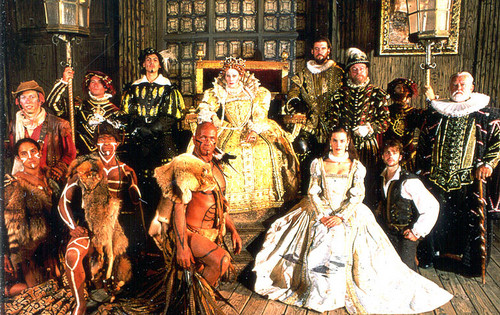Americana: North Carolina
31 Aug - 25 Sep 2010

The cast of The Lost Colony, © 2002. Photo courtesy of the Roanoke Island Historical Association producers of The Lost Colony. www.thelostcolony.org.
AMERICANA: NORTH CAROLINA
Choose Your Own History: Roanoke, The Lost Colony
Mary Augustine Gallery
Aug. 31–Sept. 25, 2010
Perhaps it is not a uniquely American trait, but Americans are attracted to the unknown; we love a good mystery. The state of North Carolina boasts the nation's oldest and most enduring mystery, and one that pre-dates its founding. The mystery of the colony of Roanoke is, in fact, an unsolved case over 400 years old. The colony of Roanoke—commonly known as the "Lost Colony"—was originally settled 35 years before the Mayflower docked at Plymouth Rock. A shipload of Englishmen landed at Roanoke Island, located on the Outer Banks of present-day North Carolina in 1585, setting up a fort on this small island in the midst of Native American territory. These soldiers were the first English citizens to colonize the "New World."
This first group of pioneers abandoned the island of Roanoke after running low on supplies and in danger of conflict with neighboring Native American tribes. Two years later, a larger group—of over 115, including women and children—made the voyage to Roanoke to attempt another settlement. Whether Roanoke was their intended destination or not remains unknown—as does the fate of this group of colonists who eventually disappeared from the island, and left almost no trace of their existence.
In the four centuries between the mysterious exodus of the colonists and today, countless theories—from the plausible to the absurd—have emerged. A unique convergence of history and mystery, Roanoke has become an American fascination. We are enthralled by this event, wrapped up in the mystery of our collective beginnings, and motivated by the simultaneous feelings of discomfort and energy that such an unstable narrative engenders. We continue to search and to wonder, even though centuries of failed investigations, cover-ups, and time itself have made the "truth" inaccessible to us.
The colony of Roanoke has inspired a slew of projects, including one of the longest-running outdoor theater productions in history; a handful of romance novels; folk tales and epic poems; countless children's books; several documentary films; and at least one low-budget horror movie. Some of these texts make claims towards being "historical," while others are flagrantly "fictional," but in the end, each one presents a narrative that is as equally possible—in this void of "truth"—as any other. Using the model of the "Choose Your Own Adventure" book series, this display invites viewers to become the author of the history of Roanoke. Narratives culled from these sources and others provide the viewers the opportunity of authorship, as well as the chance to un-do and re-do history. Unlike most of our history that is written, and perhaps revised, but always authored for us, the colony of Roanoke provides a glimpse at the wide-open possibilities of re-imagining our past.
Elizabeth Glass
Choose Your Own History: Roanoke, The Lost Colony
Mary Augustine Gallery
Aug. 31–Sept. 25, 2010
Perhaps it is not a uniquely American trait, but Americans are attracted to the unknown; we love a good mystery. The state of North Carolina boasts the nation's oldest and most enduring mystery, and one that pre-dates its founding. The mystery of the colony of Roanoke is, in fact, an unsolved case over 400 years old. The colony of Roanoke—commonly known as the "Lost Colony"—was originally settled 35 years before the Mayflower docked at Plymouth Rock. A shipload of Englishmen landed at Roanoke Island, located on the Outer Banks of present-day North Carolina in 1585, setting up a fort on this small island in the midst of Native American territory. These soldiers were the first English citizens to colonize the "New World."
This first group of pioneers abandoned the island of Roanoke after running low on supplies and in danger of conflict with neighboring Native American tribes. Two years later, a larger group—of over 115, including women and children—made the voyage to Roanoke to attempt another settlement. Whether Roanoke was their intended destination or not remains unknown—as does the fate of this group of colonists who eventually disappeared from the island, and left almost no trace of their existence.
In the four centuries between the mysterious exodus of the colonists and today, countless theories—from the plausible to the absurd—have emerged. A unique convergence of history and mystery, Roanoke has become an American fascination. We are enthralled by this event, wrapped up in the mystery of our collective beginnings, and motivated by the simultaneous feelings of discomfort and energy that such an unstable narrative engenders. We continue to search and to wonder, even though centuries of failed investigations, cover-ups, and time itself have made the "truth" inaccessible to us.
The colony of Roanoke has inspired a slew of projects, including one of the longest-running outdoor theater productions in history; a handful of romance novels; folk tales and epic poems; countless children's books; several documentary films; and at least one low-budget horror movie. Some of these texts make claims towards being "historical," while others are flagrantly "fictional," but in the end, each one presents a narrative that is as equally possible—in this void of "truth"—as any other. Using the model of the "Choose Your Own Adventure" book series, this display invites viewers to become the author of the history of Roanoke. Narratives culled from these sources and others provide the viewers the opportunity of authorship, as well as the chance to un-do and re-do history. Unlike most of our history that is written, and perhaps revised, but always authored for us, the colony of Roanoke provides a glimpse at the wide-open possibilities of re-imagining our past.
Elizabeth Glass
